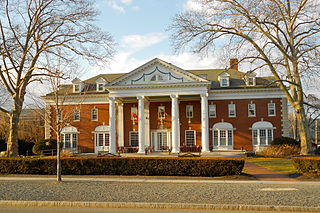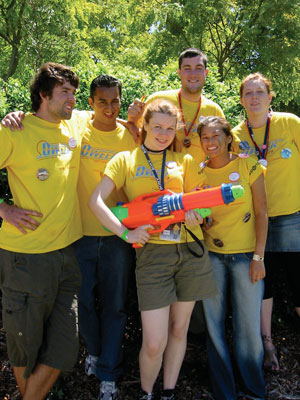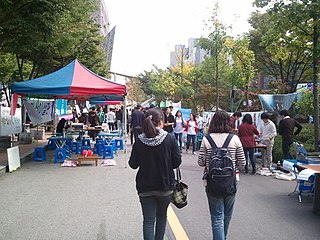
The Texas A&M University Corps of Cadets is a student military organization at Texas A&M University. Established with the university in 1876, it is the oldest student organization on campus.

Florida Blue Key is a student leadership honor society at the University of Florida. It was founded in 1923. The organization is the oldest and most prestigious leadership honorary in the state of Florida. Members include notable politicians and prominent business leaders. Florida Blue Key recognizes a class of students each semester who have displayed exemplary leadership on campus and have made significant contributions to the University of Florida through service.

The Virginia Tech Corps of Cadets (VTCC) is the military component of the student body at Virginia Polytechnic Institute and State University. Cadets live together in residence halls, attend morning formation, wear a distinctive uniform, and receive an intensive military and leadership educational experience similar to that available at the United States service academies. The Corps of Cadets has existed from the founding of the Virginia Agricultural and Mechanical College in 1872 to the present-day institution of Virginia Tech, which is designated a senior military college by federal law. As of August 2021, about 1,200 cadets are currently enrolled in the program.

Colonial Club is one of the eleven current eating clubs of Princeton University in Princeton, New Jersey, United States. Founded in 1891, it is the fifth oldest of the clubs. It is located on 40 Prospect Avenue.

National Junior College (NJC) is a government junior college located in Bukit Timah, Singapore. Established in 1969, it was the first government junior college in Singapore. NJC offers a two-year course for pre-university students and a six-year Integrated Programme, both leading to the Singapore-Cambridge GCE Advanced Level examinations. It is among top 5 junior colleges in the country in terms of minimum entry cut off points. Prime Minister of Singapore Lee Hsien Loong is among its notable alumni.

Texas A&M University–Kingsville is a public research university in Kingsville, Texas. It is the southernmost campus of the Texas A&M University System. The university developed the nation's first doctoral degree in bilingual education. It is classified among "R2: Doctoral Universities – High research activity" and accredited by the Southern Association of Colleges and Schools (SACS).

Education in North Korea is universal and state-funded schooling by the government. As of 2021, UNESCO Institute for Statistics does not report any data for North Korea's literacy rates. Some children go through one year of kindergarten, four years of primary education, six years of secondary education, and then on to university.

Korea University is a private university in Seoul, South Korea. Established in 1905, the university was named after Goguryeo. The university is one of the SKY universities.
This article contains detailed information on a number of student groups at Dartmouth College. For more information on athletic teams, please see Dartmouth College athletic teams. For more information on college publications, please see Dartmouth College publications.

Mt. Edgecumbe High School is a public boarding high school in Sitka, Alaska in the United States. Located on Japonski Island, across Sitka Harbor from the northwestern corner of downtown Sitka, the school is situated on a portion of Sitka's former World War II-era military installations. Established in 1947 after the military abandoned the area, the school was originally operated by the federal Bureau of Indian Affairs (BIA) as part of a network of boarding high schools, which included schools in Eklutna and Wrangell. After several decades of operation by the BIA, the school was briefly closed in the 1980s before being reopened by the Alaska Department of Education, which operates it today.

Cate School is a highly selective, coeducational university-preparatory school for boarding and day students in grades 9-12 located in Carpinteria, California, eleven miles from Santa Barbara. In 2012, the school had 270 students, who came from 31 states and 18 foreign countries. In 2022, Niche ranked Cate School the best boarding school in California and the 13th-best in the United States.

Student orientation or new student orientation is a period before the start of an academic year at a university or tertiary institutions. A variety of events are held to orient and welcome new students during this period. The name of the event differs across institutions. Post-secondary institutions offer a variety of programs to help orient first year students. These programs can range from voluntary community building activities to mandatory credit-based courses designed to support students academically, socially, and emotionally. Some of these programs occur prior to the start of classes while other programs are offered throughout the school year. A number of research studies have been done to determine the factors to be considered when designing orientation/transition programs.

Konkuk University is a South Korean private university founded in 1946 and it is one of the top universities in South Korea. The university was founded based on three virtues: sincerity, fidelity, and righteousness.
The First-Year Experience (FYE) is a program at many American colleges and universities designed to help students prepare for the transition from high school to college. FYE programs often foster the participation of students in co-curricular events such as common reads, concerts, art exhibits, and guest lectures.

Rashtriya Military School, Dholpur is one of the five military schools of India. It is situated in Dholpur in Rajasthan and was established in 1962 by the former Defence Minister late Sh Krishnan Menon to facilitate education of the children of the Defense personnel as well as the civilians. Military Schools in India were previously known as King George Royal Indian Military College.

Brehm Preparatory School is a not-for-profit 501 (c)(3) co-educational college preparatory day and boarding school for students with learning disabilities, founded in 1982. Brehm Preparatory School is located in Carbondale, Illinois. The school enrolls students in grades 6-12+. The average class size is eight in core content classes and 5 in learning cognition classes. Brehm's student-teacher ratio is 6:1.
Hankuk Academy of Foreign Studies is a private boarding school located in the northern part of Yongin, South Korea, and is the first Korean high school formed by a collaboration between the government and a university. It is the most selective and prestigious boarding school in Korea, renowned for its high academic levels and successful college admission results.

University culture in South Korea was formed in the tumultuous social milieu of nearly four decades-long autocratic rule. University students found their identity through organizing and spearheading anti-corruption and anti-dictatorship mass protests such as the 1960 April Revolution, the 1979 Bu-Ma Democratic Protests, the 1980 Gwangju Uprising, and the 1987 June Struggle. Despite government crackdown, student activities promoting free exchange of ideas and free expression continued on university campuses in the form of student clubs. Big-character posters, historically used to publicly demonstrate opposition to military dictatorship, are a lasting tradition that can be seen on university walls to this day. Such student club culture and the activities remain the linchpin of university life.

A hasukjib is a type of housing in South Korea that is commonly used by working adults but more popular among university students. Typically, hasukjib take the form of a small room with a single bed, desk and a mini fridge. There are several rooms on each floor of the building and usually has a restroom, shower and laundry room shared by the tenants. Meals are also often provided by the landlord or more commonly a landlady and included in the rent. The rent varies by the size of the rooms and quality of the facilities, but it's generally considered cheap and affordable. Hasukjib are often compared to gosiwon, a similar form of single-room housing in Korea.


















